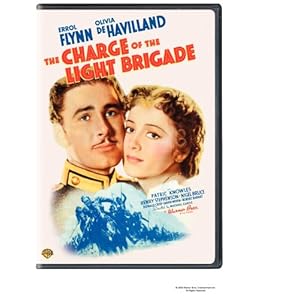
The first real disappointment I've had watching an Errol Flynn movie. The first two-thirds is great, with Flynn part of the 27th Bengal Lancers on the Indian frontier. I think the ending, while filmed quite well with the cavalry charge, falls apart though.
While it's not unusual for a Hollywood movie (and an Errol Flynn movie...see They Died with Their Boots On) to get the actual history wrong (and this movie has a disclaimer at the beginning), the way in Brigade gets it wrong ends up making it hard to respect Flynn's Major Georffrey Vickers character.
Stationed in Indian, Flynn's Vickers saves the life of Surat Khan (the leader of the fictional country of Suristan). Also in India is Vickers' brother, Captain Perry Vickers, who has stolen the love of Geoffrey's fiancee Elsa (Olivia de Havilland). Later, Surat Kahn (angered that the British will no longer pay him for his loyalty) massacres the inhabitants of Chukoti (mainly wives and children) but spares Geoffrey and Elsa to repay his debt. Kahn aligns himself with Russia, and ends up in Balaclava during the Crimean War. When Geoffrey finds out that Kahn is with the Russian troops opposite the 27th Lancers, he changes the written orders of Sir Charles Macefield, ordering the commander of the Light Brigade, Sir Benjamin Warrenton, to attack. Vickers orders the attack so the Lancers can avenge the Chukoti massacre. He sends a note to Macefeild explaining his actions, and has his brother Perry deliver it so he will survive.
The charge takes place, the cavalry facing the Russian cannons, and though the Lancers are wiped out, Geoffrey is able to find and kill Surat Khan, even as he dies. Receiving the note, Macefield takes responsibility for the charge, burning the note.
While I can accept that Geoffrey felt the need to avenge the terrible massacre, he condemned not only the 27th Lancers but the other members of the Brigade to death, and did it by disobeying orders. This leaves a bad taste in my mouth, making it impossible to feel as if he is a hero. I suppose it would be difficult to film the actual history and have a hero, but I would have expected the fictional story to do a better job.
The charge itself is well staged, though it was filmed with trip wire, which resulted in dozens of horses being killed. This helped lead to the ASPCA banning trip wires from films, and the U.S. Congress taking action to protect animals during filming.
No comments:
Post a Comment